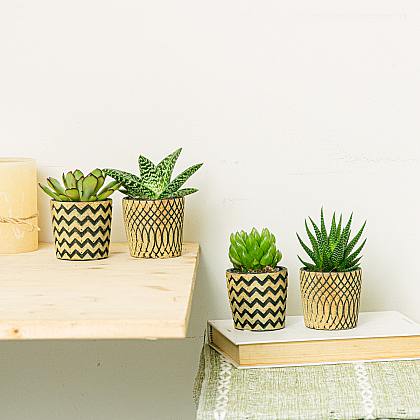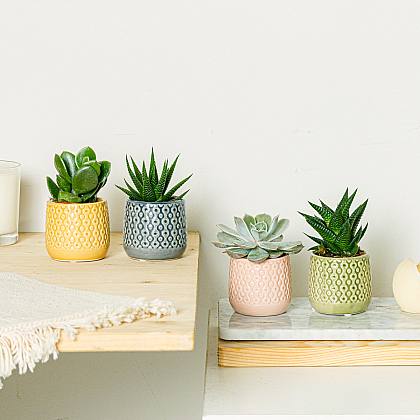Get to know the plants that don't wilt with winter heating
Have you ever wondered why some plants can't survive winter heating? If you're a plant lover and want to maintain a green home all year round, this guide is for you
Have you ever wondered why some plants can't survive winter heating? If you're a plant lover and want to maintain a green home all year round, this guide is for you. Discover the best plants to have at home during the winter, learn tips for caring for your plants at this time of year, and create your own winter garden with plants that complement each other. In addition, you will learn about hardy and easy-to-care houseplants, as well as how to choose the right pots for your winter plants. You'll also discover how some plants can purify the air and improve the quality of the environment in your home. Get ready to enjoy a green and cozy home all year round!
Why Do Some Plants Can't Handle Winter Heating?
Some plants can't withstand winter heating because they need certain environmental conditions to survive. Most plants are native to tropical and subtropical regions, where the temperature is warm and constant throughout the year. When transplanted indoors, these plants may find it difficult to adapt to sudden changes in temperature and humidity. Winter heating can dry out the air, negatively affecting many plants that require high ambient humidity. Additionally, some plants need a winter rest period to prepare for the next growing season, and winter heating can interfere with this process.
Another factor that contributes to the inability of some plants to survive the winter is a lack of sunlight. In winter, the days are shorter and there is less sunlight available to the plants. Many plants need a specific amount of sunlight to grow and thrive, so a lack of sunlight can weaken them and make them more susceptible to diseases and pests.
In short, some plants can't withstand winter heating due to a lack of ambient humidity, sudden changes in temperature and humidity, lack of sunlight, and impeding their natural winter resting process. It is important to keep these considerations in mind when choosing plants that will be kept indoors during the winter to ensure their survival and well-being.
Best Plants to Keep at Home During the Winter
The best plants to keep at home during the winter are those that have a high tolerance to low temperatures and require little sunlight. Some ideal choices include Boston fern, African violet, sansevieria, spathiphyllum, and snake plant. Not only are these plants cold-hardy, but they are also easy to care for, making them perfect choices for those who have no prior gardening experience. In addition, these plants are known for their ability to purify the air and improve the quality of the environment in the home. The Boston fern is especially recommended as it can survive in low humidity conditions and adapts well to winter heating. African violet is another popular choice due to its beautiful flowers and ability to thrive in low-light environments. On the other hand, sansevieria is known as a hardy plant capable of surviving even in the harshest conditions. Spathiphyllum and snake plant are also great choices, as they require little light and care. In summary, when choosing the best plants to keep at home during the winter, it's important to consider their cold hardiness, their ability to adapt to low-light conditions, and their ease of care.
Tips for caring for your plants in winter
During the winter, our plants need special care to survive. For starters, it's important not to expose them to extremely low temperatures. If you have plants outside, cover them with a blanket or plastic to protect them from frost. On the other hand, make sure you don't overwater your plants, as it can take longer for the soil to absorb water during the winter and this could damage their roots. Also, avoid placing your plants near windows where cold drafts occur. Another recommendation is to reduce the amount of fertilizer given to plants at this time of year, as their growth is slower and they need fewer nutrients. If you have indoor plants, try to place them in areas with good natural lighting so that they can photosynthesize properly. You can also use special plant lamps if you don't have enough natural light. Finally, keep your plants clean and dust-free to prevent the accumulation of pests and diseases. With these tips, you'll be able to keep your plants healthy and green all winter long.
Create Your Own Winter Garden: Plants That Complement Each Other
Creating a winter garden can be a fun and relaxing task, but it also requires planning and knowledge. It is important to choose the right plants that complement each other and can survive the winter conditions. Some plants that complement each other well are cyclamen and African violet, both of which bloom in winter and require little light. Plants of different heights, such as orchid and fern, can also be combined to create a more dynamic environment. Additionally, it is important to consider the humidity of the air in the home, as many plants need a moist environment to survive through the winter. For example, houseplants such as lucky bamboo or bamboo palm are ideal for increasing air humidity.
Another important factor to consider when creating a winter garden is temperature. Some plants require warmer temperatures than others, so you need to group them according to your needs. For example, tropical plants such as bromeliad or anthurium should be kept at a constant temperature of 20-25 degrees Celsius, while succulent plants such as cactus or spider plant can withstand colder temperatures.
In short, creating a successful winter garden involves carefully choosing plants that complement each other and can survive winter conditions. Factors such as air humidity and temperature should be considered to ensure that the plants are healthy and bloom throughout the winter.
Hardy, easy-to-care houseplants
For those who want to have houseplants, but don't have a lot of time or experience to care for them, there are some hardy, easy-to-care plant options. One of them is sansevieria, also known as mother-in-law's tongue, which is a plant that requires very little water and light, making it ideal for those who don't have a lot of time to devote to their plants. Another option is the cactus, a plant that can survive even in the most extreme conditions and requires very little watering. In addition, there are many different varieties of cacti to choose from, allowing you to add variety to any home. Pothos is another hardy plant that is easy to care for. This plant has glossy, green leaves and can survive in low-light conditions and with very little watering. It has also been shown to help purify indoor air by removing toxic chemicals from the air. Lastly, dracena marginata is another popular choice for those looking for hardy houseplants. This plant can survive in low-light conditions and requires very little watering. Plus, it has bright red and green leaves, making it a colorful addition to any home. In short, these are just a few of the many options available to those looking for hardy, easy-to-care houseplants.
How to Choose the Right Pots for Your Winter Plants
Choosing the right pots for your winter plants is essential to ensure their survival and good development during this season. One of the most important considerations when selecting a pot is size. Plants need enough space for their roots to grow and develop properly, so it's essential to choose a pot large enough to allow for this growth. In addition, it is advisable to opt for pots with good drainage, as excess water can be harmful to plants in winter, when watering must be reduced. Clay or terracotta pots are great choices, as they allow for better air exchange and prevent moisture buildup at the roots. It is also important to consider the material of the pot in relation to the environmental conditions. If you have central heating at home, you may find that the environment becomes very dry during the winter, which can affect the health of your plants. In this case, it is advisable to opt for ceramic or glass pots, as they retain moisture better and help maintain an adequate level of humidity in the substrate. Finally, remember to choose pots that match your home décor and are stable enough to avoid accidents. By following these tips when choosing pots for your winter plants, you can provide them with an environment conducive to their growth and enjoy a green home all year round.
Plants that purify the air and improve the quality of the environment in your home
Plants that purify the air and improve the quality of the environment in your home are an excellent option for maintaining a healthy, pollutant-free environment. These plants have the ability to absorb toxic substances present in the air, such as formaldehyde, benzene, and xylene, releasing fresh, clean oxygen around them. Some of the plants best known for their purifying properties are the peace lily, bamboo palm, pothos, and tiger's tongue.
In addition to purifying the air, these plants can also help improve mood and reduce stress. The presence of greenery in the home creates a sense of calm and tranquility, which can contribute to a more relaxed and harmonious environment.
For best results, it's important to place these plants in areas where there is good air circulation and natural light. It is also essential to keep them properly watered and clean their leaves regularly to prevent dust accumulation.
In short, having plants that purify the air in your home is an effective and natural way to improve the quality of the indoor environment. In addition to their purifying function, these plants bring beauty and freshness to the space, creating a welcoming and healthy environment for you and your family.
All in all, maintaining a green home all year round is not only possible, but it can also be a rewarding and beneficial task for health and the environment. With the right selection of plants, pots, and care, we can enjoy a cooler and cleaner environment at home during the colder months of the year. Additionally, having a winter garden can be a creative and fun way to explore our passion for plants and nature. However, despite all the benefits, it's important to remember that each plant has its own unique needs and characteristics, so it's essential to do your research and experiment to find what works best for us and our home. What other ways do you know to have a greener and more sustainable home?


